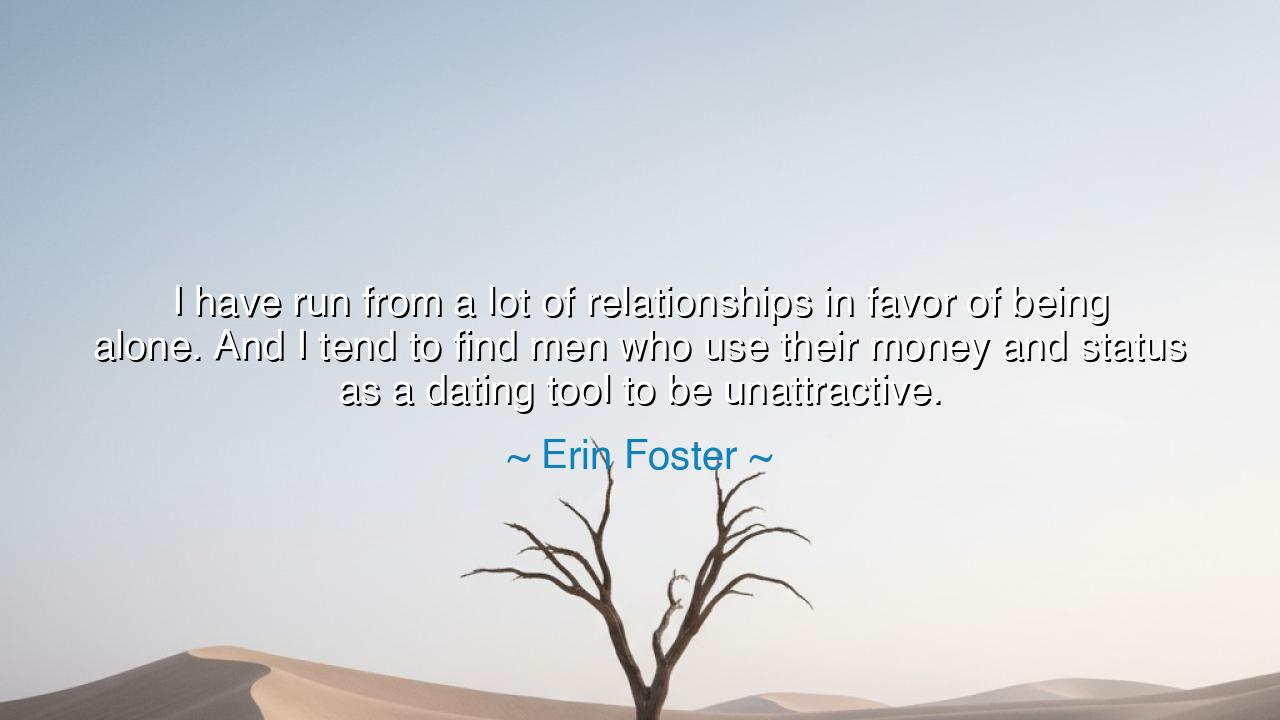
I have run from a lot of relationships in favor of being alone.
I have run from a lot of relationships in favor of being alone. And I tend to find men who use their money and status as a dating tool to be unattractive.






When Erin Foster said, “I have run from a lot of relationships in favor of being alone. And I tend to find men who use their money and status as a dating tool to be unattractive,” she revealed a truth both deeply personal and universally human. Beneath her words lies not cynicism, but courage — the courage to choose solitude over superficiality, and authenticity over illusion. Hers is the voice of one who has glimpsed the emptiness that often hides behind the glitter of worldly success, and who has learned that love, stripped of sincerity, is not love at all. Her confession is not a rejection of companionship, but an affirmation of self-respect, the kind of strength that arises when one refuses to settle for less than truth.
The origin of her statement lies in the modern landscape of relationships — a world where the pursuit of love is often tangled with ambition, appearance, and social performance. In such a world, to value authentic connection over wealth or status is an act of quiet rebellion. Foster’s words remind us that many chase companionship not to be understood, but to be admired; not to give love, but to showcase themselves. She stands apart from this, choosing solitude over pretense, reflection over distraction. The ancients would have called this the path of integrity — the refusal to trade the soul’s freedom for comfort or applause.
To the philosophers of old, solitude was not a curse but a sacred discipline. The Greek sage Diogenes lived in a barrel, scorning material wealth and human vanity. When the conqueror Alexander the Great came to meet him and asked if there was anything he could do for him, Diogenes simply replied, “Yes — stand out of my sunlight.” Like Foster, he valued authenticity over artifice, and freedom over flattery. Both understood that true wealth lies not in possessions or power, but in inner peace — a state that cannot be bought or borrowed, only cultivated.
Foster’s disdain for men who wield their money and status as tools of seduction echoes an ancient warning about pride and illusion. The Roman philosopher Seneca wrote that “the first proof of a well-ordered mind is a man’s ability to remain in one place and enjoy his own company.” Those who must dazzle others with symbols of power often reveal, unconsciously, an emptiness within. Wealth, when used as bait, is not generosity but vanity — a hollow offering meant to impress rather than to connect. Foster sees through this illusion and, in doing so, honors the higher principle of authentic worth — that love is not about what one has, but about who one is.
There is also in her words a kind of heroism — the bravery to walk alone rather than in false company. Many fear solitude, mistaking it for loneliness, but the wise have always known that solitude is the crucible of the soul. It is where one learns discernment, clarity, and strength. Foster’s choice to “run from relationships in favor of being alone” is not an escape from love, but a declaration that love must be founded on equality and respect. Like a warrior who refuses to bow before false idols, she reminds us that to stand alone in truth is nobler than to sit surrounded by illusion.
Consider the story of Hypatia of Alexandria, the great philosopher and teacher of the ancient world. She too lived in a time when power and status were worshipped, yet she remained unmoved by such things. She refused marriage, not out of bitterness, but because her devotion was to wisdom and authenticity. Her students revered her not for her beauty or wealth, but for her integrity and intellect. In her life, as in Foster’s words, we see that self-possession is the highest form of freedom, and that love, when it comes, should honor that freedom — not threaten it.
The lesson of Erin Foster’s words is clear: never let the glitter of the world distract you from the gold of the soul. Seek relationships not built on status or possession, but on truth, respect, and mutual growth. If love does not deepen your peace or strengthen your spirit, let it pass. Choose solitude when the alternative is compromise. The ancients taught that to know oneself is the beginning of wisdom — and Foster’s wisdom is this: it is better to walk alone in authenticity than to be accompanied by pretense.
So, let her words echo across the generations as a call to integrity: do not mistake loneliness for weakness, nor wealth for worth. In a world obsessed with appearance, dare to value substance. In a world that fears silence, learn to find comfort in your own company. For when you love yourself enough to stand alone, you invite only those who will walk beside you — not out of vanity, but out of genuine connection. And in that sacred space, love ceases to be a performance and becomes what it was always meant to be: a meeting of souls, equal and free.






AAdministratorAdministrator
Welcome, honored guests. Please leave a comment, we will respond soon